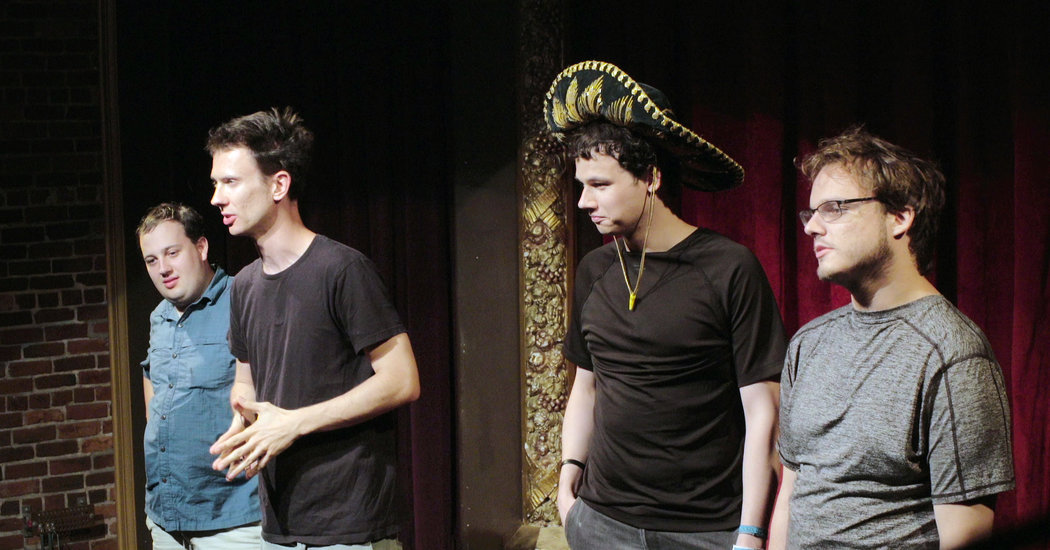
My son often asks, “What do you have against jokes?”
“Nothing,” I reply.
“Well, stop killing them,” he says.
He’s 18, autistic, and does standup. He has learned the importance of delivery and timing, skills mastered by the best comics. Despite this, many people believe people with autism are humorless.
Tell that to Jerry Seinfeld, Michael Palin and Dan Aykroyd. All identify themselves as having autism spectrum disorder, or A.S.D. One of Mr. Aykroyd’s symptoms included an obsession with ghosts and law enforcement. His deep interest in the ghost hunter Hans Holzer inspired him to co-write “Ghostbusters.”
“It’s a huge myth that people with A.S.D. don’t understand or are not interested in humor,” said Thomas Frazier, chief science officer at Autism Speaks, an advocacy organization that sponsors research and conducts awareness and outreach activities. “And the types of humor they like, understand, and even don’t get comes down to the individual. It’s the same with neurotypicals. It’s all about teaching the mechanics of it, and once you are comfortable with it, you come to appreciate it.”
Of course, the autism spectrum is broad, and some people on it may appreciate certain jokes more than others. “Humor is personal, individualized, and people process jokes differently,” Dr. Frazier said.
A 2018 study published in the journal Psychological Reports found people on the spectrum struggle with jokes that defy logic and familiarity. The setup is followed by a punch line with a twist. “Having a joke take you on a totally different path from the setup is disconcerting,” Dr. Frazier said. “A lot of people with autism don’t like incongruous humor.”
A 2017 study by Shaun May, senior lecturer in drama and theater at the University of Kent, explored how people with autism benefit from comedy workshops. Dr. May interviewed the four members of Asperger’s Are Us, a comedy troupe recently featured in the HBO Documentary series, “On Tour With Asperger’s Are Us.”
Dr. May’s study undermines the myth that people with autism don’t have a sense of humor. He points to Hans Asperger’s 1944 research, which claimed that many people with Asperger’s syndrome “had a deficit of humor.” (Asperger’s syndrome is no longer used as a separate diagnosis, but is considered part of the autism spectrum.)
Dr. May said, “Just because you or I might find things funny, it doesn’t mean we have more or less of a sense of humor.”
Despite our different tastes, laughter is a powerful tool that can bring us together. In the world of autism, where people struggle with personal connections, humor unites. I see it with my son when he does standup. He seems to interact effortlessly with the audience and people who approach him after the show.
“It does help with socialization,” Dr. Frazier said. “Teaching comedy techniques is a great way to overcome social issues. And getting someone — anyone, someone with A.S.D. or neurotypicals — to get up in front of an audience can be scary. What if you bomb? Many people on the spectrum have a deep determination to succeed. So, if they don’t get a million laughs the first time, they’ll try it again and again.”
Once they’re on stage they can talk about their disorder or focus on what they find funny. My son usually sticks to puns, but he recently opened with: “I have autism. I also have O.C.D., O.D.D., A.D.H.D. and A.D.D., and I’m the most normal comic you’re going to see on stage tonight.”
The members of Asperger’s Are Us also sometimes joke about their diagnoses, as when a member known as New Michael Ingemi (his dad is “Old Michael”) said, “If we’re not funny, blame it on Ethan’s disability,” referring to another member, Ethan Finlan.
Jack Hanke, who just turned 26, prefers to go by the group’s total age; that’s all four of them together, making him 114 years young. He likes to keep his diagnosis and his comedy career as separate as possible.
“Since our name is Asperger’s Are Us, it’s impossible for us ever to perform without people knowing our diagnosis,” he said. “I do think it’s important for people with Asperger’s — and this really applies to most groups of people, not just Aspies — to realize that, while they don’t necessarily owe society an explanation about anything, society also can’t be blamed for failing to understand them if they don’t share their own perspective on issues that affect them.”
Noah Britton, 36, agrees with Mr. Hanke. He avoids autism jokes and prefers deadpan comedy. He wishes more people realized it’s a joke when someone says something so absurd that no one would ever say out loud. He counts Steven Wright and Monty Python as his favorites.
“And the reception’s been pretty good when I’m not in a dead zone,” he deadpans. “Am I allowed to say Verizon does a great job with that?”
Referring to audience members, he said: “I don’t know if they have a diagnosis or not. People who like that joke like us. People who don’t like that joke also sometimes like us.”
Alex Lehmann, 37, director of “On Tour with Asperger’s Are Us,” had no experience interacting with people on the spectrum before he directed the documentary series. “My preconceptions were that autism and comedy did not go hand-in-hand,” he said. After spending time with the members of Asperger’s Are Us, I realized I needed to be thinking very fast to keep up with these guys.”

